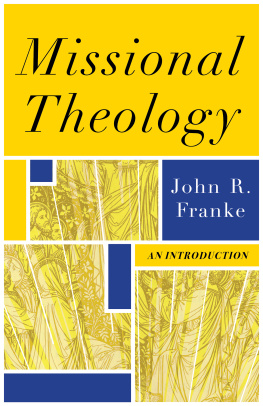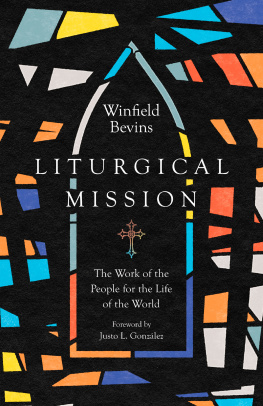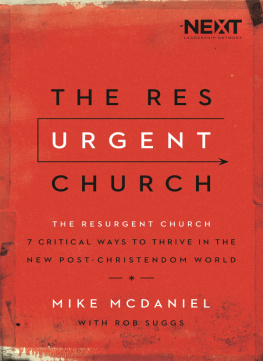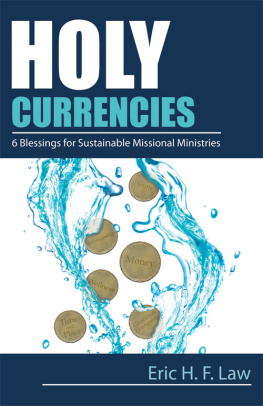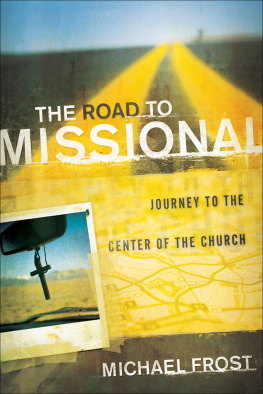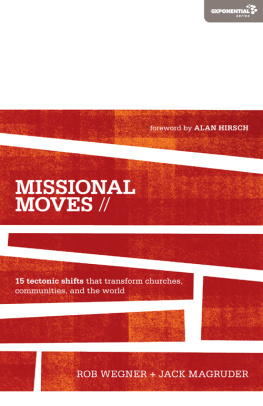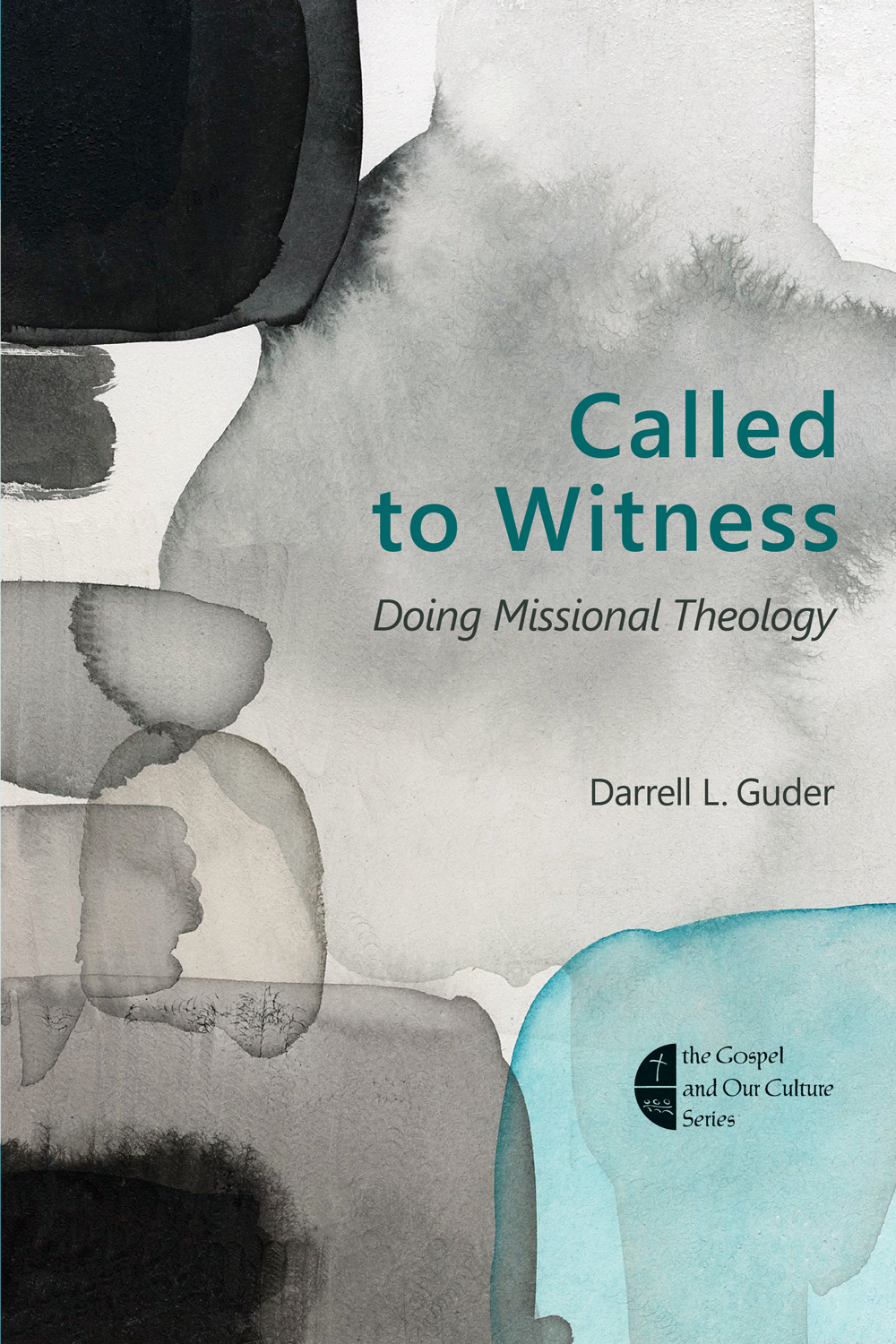The Gospel and Our Culture Series
A series to foster the missional encounter of the gospel
with North American culture
John R. Franke
General Editor
Volumes Published to Date
Lois Y. Barrett et al., Treasure in Clay Jars: Patterns in Missional Faithfulness
James V. Brownson, Inagrace T. Dietterich, Barry A. Harvey,
and Charles C. West, StormFront: The Good News of God
Michael J. Gorman, Becoming the Gospel: Paul, Participation, and Mission
Darrell L. Guder, Called to Witness: Doing Missional Theology
Darrell L. Guder, The Continuing Conversion of the Church
Darrell L. Guder, editor, Missional Church: A Vision for the
Sending of the Church in North America
George R. Hunsberger, Bearing the Witness of the Spirit:
Lesslie Newbigins Theology of Cultural Plurality
George R. Hunsberger, The Story That Chooses Us:
A Tapestry of Missional Vision
George R. Hunsberger and Craig Van Gelder, editors, The Church between Gospel and Culture: The Emerging Mission in North America
Craig Van Gelder, editor, Confident Witness Changing World:
Rediscovering the Gospel in North America
Called to Witness
Doing Missional Theology
Darrell L. Guder
William B. Eerdmans Publishing Company
Grand Rapids, Michigan / Cambridge, U.K.
2015 Darrell L. Guder
All rights reserved
Published 2015 by
Wm. B. Eerdmans Publishing Co.
2140 Oak Industrial Drive N.E., Grand Rapids, Michigan 49505 /
P.O. Box 163, Cambridge CB3 9PU U.K.
Printed in the United States of America
Library of Congress Cataloging-in-Publication Data
Guder, Darrell L., 1939
Called to witness: doing missional theology / Darrell L. Guder.
pages cm. (The Gospel and our culture series)
Includes bibliographical references.
ISBN 978-0-8028-7222-7 (pbk.: alk. paper)
eISBN 978-1-4674-4389-0 (ePub)
eISBN 978-1-4674-4349-4 (Kindle)
1. Mission of the church. 2. Church.
3. Evangelistic work. 4. Missions. I. Title.
BV601.8.G785 2015
266.001 dc23
2015014137
www.eerdmans.com
To my students at Princeton Theological Seminary from 2002 to 2015,
with whom and from whom I continue to learn
how to do missional theology
Contents
8. The Worthy Walk of the
Missional Community after Christendom
10. Missio Dei: Integrating Theological Formation
for Apostolic Vocation
In one sense, the use of the adjective missional in conjunction with the idea of theology should be seen as an unnecessary redundancy. In the history of the church, it is the missionary encounter with surrounding cultures and the effort to bear faithful witness to the gospel in the midst of these social settings that provides the context for all theological reflection. The New Testament itself is best understood as a collection of writings focused on missiological practice. Pauls letters were written in conjunction with his missionary activity and wrestle with the questions and challenges that arise from the missionary engagement of the church with the world. The Gospels are missional reflections on the life and ministry of Jesus that arise in the context of particular cultural settings and concerns. Indeed, the origins of all the New Testament documents are found in the missionary activity and witness of the earliest Christians who are telling the story of Jesus and reflecting on the implications of that story for themselves and the world around them in the common idioms of their day. The oft-repeated assertion that mission is the mother of theology arises directly from the New Testament. Christian theological reflection has its roots in a missionary praxis connected with the sending of the church to bear witness to the gospel among all the peoples of the earth.
In another sense, however, the adjectival use of missional to describe the nature, task, and purpose of theology has become a necessary modifier in the contemporary setting. With the advent of Christendom, the missionary impulse for theology was minimized and the substance of the Western Christian tradition took its distinctive shape during the long period in which Western Christendom was an almost enclosed ghetto precluded from missionary advance. In this context the intuitions and assumptions that governed the discourse of theology were increasingly those of Christendom rather than missionary encounter.
This shift had a profound effect on the discipline of theology and led to its virtual separation from the missionary witness of the church. Even as the West faces the eclipse of Christendom and the emergence of an increasingly virulent post-Christian culture, most theology is still taught with primary reference to early modern debates and concerns rather than to those of mission. Courses in missiology are generally taught only in the practical theology department of seminaries and are often primarily for those heading overseas. Rarely are such courses taught in the systematics department, and the two disciplines, missiology and systematic theology, have generally evidenced little significant overlap or interaction.
The effort to repair this divide and restore the inherent relationship between mission and theology has resulted in the emergence of missional theology as a distinctive approach to the discipline. A missional approach to theology arises from the conviction that the triune God is, by Gods very nature, a missionary God and that therefore the church of this God is missionary by its very nature. From this perspective mission defines the church as Gods sent people and is therefore at the very core of the churchs reason and purpose for being and should shape all that the church is and does. In the words of the authors of Missional Church: Either we are defined by mission, or we reduce the scope of the gospel and the mandate of the church. Thus our challenge today is to move from church with mission to missional church. Like the challenge facing the church in moving from church with mission to missional church, so the discipline of theology, if it is to serve the church and be faithful to its subject, must move from theology with a mission component to a truly missional conception of theology that is, one in which mission is at the very core in both concept and method.
This task has captured the attention of commentators, teachers, researchers, practitioners, and consultants alike, and the notion of missional theology has become increasingly ubiquitous among the churches and schools of North America. It seems these days that everyone is missional. Yet in spite of all this, as one recent observer has noted, there really is no shared notion about what missional theology is to this point there has been no substantive crosscurrent of conversation about the parameters and shape of missional theology. The emergence of such a crosscurrent of conversation about the nature, task, and purpose of theology in missional perspective is a crucial phase in the process of its development.
It is precisely at this point that I believe the publication of this collection of essays by Dr. Darrell Guder to be of particular significance in the development of missional theology. For over two decades Guder has been one of the leading voices in conceptualizing and developing the themes of the missional church, missional hermeneutics, and missional theology. While he is perhaps best known as one of the authors and the editor of Missional Church, he has also been one of the leading voices in the Gospel and Our Culture Network (GOCN); the missional hermeneutics forum sponsored by the GOCN that has been meeting at the annual meeting of the Society of Biblical Literature; and the American Society of Missiology, serving as president in 2008. In addition, he has also written widely on these themes in books and articles and spoken on them in classrooms and at lecterns throughout the world in both academic and ecclesial settings.


